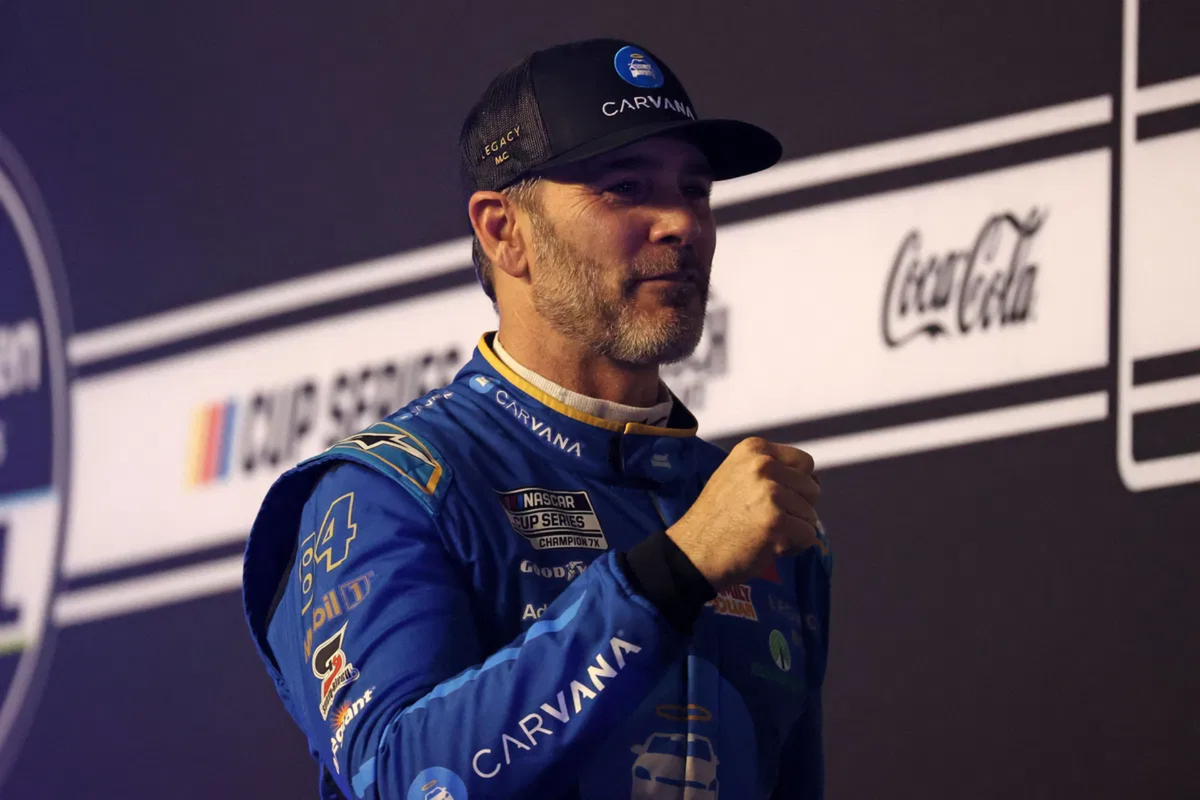



When fans look at the No. 43 Chevrolet, they see more than just another race car on the NASCAR Cup Series grid. It’s a number steeped in history, tied to Richard Petty’s unmatched legacy, and now carried by Legacy Motor Club with the star power of Jimmie Johnson behind its leadership. Expectations were naturally high when Jimmie Johnson, a seven-time champion, stepped into co-ownership and helped steer the team into a new era. Growth, however, is rarely linear in NASCAR. As the garage has shown time and again, resources, leadership, and vision do not instantly translate into speed.
Watch What’s Trending Now!
For Erik Jones, who’s tasked with carrying the weight of performance in the iconic 43, the grind to elevate the program has been anything but easy. Heading into the Coke Zero Sugar 400 at Daytona, Jones offered a candid look at what the year has revealed for Jimmie Johnson’s team, Legacy Motor Club, and what it hasn’t yet delivered.
“We’re still climbing that mountain”: Jones on the team’s progress
Erik Jones didn’t sugarcoat the reality when asked about where Legacy Motor Club and his No. 43 car in particular stand in 2025. Speaking ahead of Daytona, his assessment was frank: the journey is still very much a work in progress. “Well… I think so… it’s obviously been a long climb… and… we’re still climbing that mountain… there’s… there’s definitely been some bright spots in there this year… which has been a… you know… a positive and needed thing,” Jones explained.
Jones’ candid tone reflects both how steep the team’s climb has been and how vital even small gains have looked compared to 2024. Last season, wins were out of reach and consistency was scarce, leaving the organization scrambling for direction. This year, Legacy has shown flashes of a few strong outings on intermediate tracks, and competitive speed on superspeedways has kept the program’s hopes alive. But NASCAR is a results-driven sport, and progress is measured against wins, stage points, and playoff contention, not merely improvements over past struggles.
That’s where the gaps remain most obvious. “It’s taking longer than we’d hope, a hundred percent,” Jones admitted on NASCAR Live podcast, referencing the rebuild. “We’ve really had to start from scratch on a lot of this stuff… our road course program, our short track program have been major struggles… and so, we really don’t have a notebook on that… and we’ve been building that out this year.”
This lack of a technical baseline has been glaring. While competitors like Hendrick Motorsports and Joe Gibbs Racing rely on robust data pipelines to refine road course and short-track setups, Legacy has had to fill in blanks. In Cup racing, starting from “zero notes” on track types that account for nearly a third of the schedule is a massive disadvantage.
Jones acknowledged that while road courses and short tracks remain problem areas, the team’s intermediate-track package is no longer a liability, giving them at least a partial foundation. “The road course and short track stuff still gotta get better… but our mile-and-a-half and speedway stuff has been strong,” he said. “Are we where we wanna be? No… I think our expectations were probably a bit higher than what we’re currently doing right now. We’re better than we were last year, but not where we wanted to be currently.”
The message was clear: improvement is happening, but not nearly at the pace many envisioned when Jimmie Johnson became a co-owner and Toyota brought new resources into the organization. Growth exists, but Legacy remains closer to the middle tier than legitimate weekly contenders.
Daytona’s weight and a shot at redemption
For Erik Jones, Daytona isn’t just another date on the NASCAR calendar; it’s the track where his Cup career took flight. His first-ever NASCAR Cup Series win came under the summer lights at the World Center of Racing, an achievement he still describes with reverence. “Well, it’s definitely special… for me, probably a little extra special… that was number one for me in Cup… so that was a cool moment… and definitely one that I think you always will remember,” Jones said, reflecting on the emotions of crossing that finish line years ago.
That history is part of why the summer race at Daytona now carries such unique meaning. Since NASCAR shifted the late-summer event to become the regular-season finale, it has added an extra layer of urgency to an already unpredictable race. Jones himself admits he embraced the change, recognizing how it injects chaos and opportunity.
“I know there was… originally a little bit of trepidation around moving this race to the season finale a few years back… I was kinda one that… I liked the idea… and… I really think it’s… it’s… I don’t know… that race didn’t really need any rejuvenation… but it’s definitely throwing some spark into it,” he explained.
The stakes this weekend are clear: win, and Legacy Motor Club rides into the playoffs. Fail to capitalize, and the year-long grind risks ending without a shot at postseason redemption. With superspeedway unpredictability in play, Jones knows that anything can happen and hopes to turn Daytona into a gateway for the turnaround he’s been working toward all season.
“It’s our last shot to make it in this weekend… and it would mean a lot to us to get in the playoffs,” he said. After a year defined by gradual gains but also unmet expectations, Daytona is more than just another race. For Erik Jones and Legacy Motor Club, it’s a chance to transform steady progress into a season-saving breakthrough.


